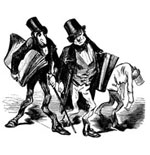
What Play Are You In?
GUEST COLUMN
This fall I gave presentations to all of the high-school teachers, staff, and administrators in the Archdiocese of Los Angeles. These talks take place on an annual basis, and they are dedicated to a regular cycle of topics. This year, the theme was morality. Lucky me! My guess was that disquisitions on doctrine, Church history, or pastoral practice wouldn’t raise too many hackles, but ethics is practically guaranteed to rile people up, especially now, when the issues of same-sex marriage, transgenderism, and assisted suicide are so present to the public consciousness.
I am not sure whether I delighted or disappointed my audiences, but I did not order my talks to address these hot-button questions. Indeed, it is my conviction that a good deal of mischief and confusion is caused precisely by characterizing Catholic morality primarily as a matrix for adjudicating such matters. A purely rational or deductive approach to controversial ethical choices is largely an exercise in missing the point. To know how to behave as a Christian is a function of knowing, first, who we are as Christians. Understanding how to act is, if I can pun a little, a function of understanding what play we are in. The great Anglican biblical scholar N.T. Wright has said that most of us are like actors who are dressed up for Hamlet, who have memorized all of the right lines from Hamlet, and who thoroughly grasp the thematics of Hamlet. The only problem is that we are in Romeo and Juliet. Therefore, what I shared with the good teachers of the L.A. Archdiocese is largely Christian anthropology — a fancy way of saying the articulation of what play we’re in and what role we’ve been given in that production.
Like the great Shakespearean plays, the drama of salvation history consists of five acts: Creation, the Fall, the Formation of Israel, the Coming of the Messiah, and the Church. Comprehending the dynamics of all five acts is indispensable to knowing how to behave. So, let’s take things one step at a time.
According to the still-breathtaking poetic account in the first chapter of Genesis, all created things come forth in an orderly and harmonious manner from the hand of the Creator. Sun, moon, planets, stars, the earth itself, animals, even those things that crawl upon the earth come into existence in a sort of stately liturgical procession. What the author is showing, first, is that none of these things — all of which at one time or another in the ancient world were the object of worship — is divine. What he is demonstrating, second, is that all of them find their purpose in giving praise to the Creator. It is of crucial significance that the final element in the parade — like the last figure in a liturgical procession — is man. We are meant to see our identity and our task: to give praise to God on behalf of all creation. Before the Fall, Adam was the first priest.
You May Also Enjoy
Among the industrial nations of the West, only the U.S. has had no democratic socialist party of national significance, nor a party to speak for the labor movement.
We are blind to the vast and real poverty of our own country, which may only become apparent upon encountering spiritual wealth.
Stem cells found in adult bone marrow, adipose tissue, fetal umbilical cords, and placenta promise equal if not greater results than embryonic stem cells.

